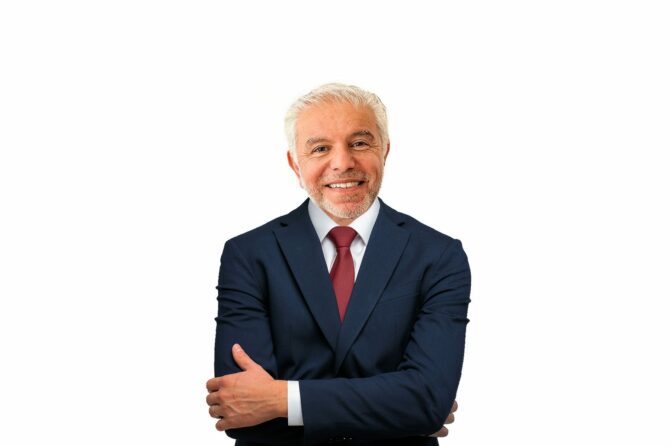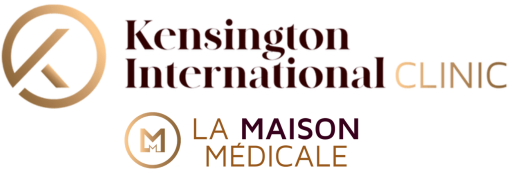
Dr. Nairi : the new face of the microbiota department – le nouveau visage du département microbiote
Kensington International Clinic is further structuring its microbiota department with the appointment of Dr. Alexandre Nairi as the head of the department. Among the pioneers in this field of research, he brings all his skills for optimal practice of preventive medicine.
Can you tell us about your journey?
A graduate of the CHU Pitié Salpétrière, I completed two years of residency at the communal hospital of Neuilly, where I received training in internal medicine. I then practiced a mix of general and internal medicine upon my establishment in Paris. Subsequently, I became the Deputy Chief Medical Officer of the National Police, working in the medical service of the Ministry of the Interior. Beyond medical aspects, this also involved managing mutation issues, as many police officers wanted to return to their original departments, which required a review of their medical records! In 1999, nearly twenty years after starting in this service, I moved to the United States for personal reasons, where I spent two years. However, there was a slight hiccup: they did not accept French diplomas, so I spent most of my time attending medical training in private hospitals and clinics. Eager for more enriching opportunities, I arrived in London in 2001.
Why London?
To be completely honest, the working conditions for my practice in France and America no longer suited me. So, I decided to change my perspective and chose the United Kingdom. I obtained an equivalence of my diploma and decided to join the NHS, initially working as a locum. Alongside this, I joined SOS Doctors. I then expanded my availability and worked mornings in local surgeries (general medicine clinics), an activity I still continue today. I also increased my work in hospitals.
What made you choose general medicine?
I didn’t want to specialize too narrowly in order to practice medicine in its broadest sense. I did consider specializing in Otolaryngology (ENT), a field I dabbled in a bit, but ultimately returned to general medicine, which has an eclectic aspect that resonates with me.
When did you become more oriented towards preventive medicine?
In 2005, I joined WOSAAM, a medical association specialized in anti-aging medicine, led by Dr. Thierry Hertoghe. This preventive medicine focused on hormone therapy and the microbiota. Monitoring imbalances in these two areas allowed us to anticipate a number of pathologies associated with the aging process. The research mainly involved minimizing aggression, hormonal rebalancing, and studying intestinal permeability…
Were there significant differences in approach?
We collaborated with the Roman PaÏs laboratory, a true institution in the field at that time. Of course, since then, research has expanded, for example with the possibilities of stool analysis, whereas at the time we did not have the necessary preservatives to treat them adequately. Moreover, certain neurological, rheumatological, inflammatory, or even burnout issues are better categorized today, as we have managed to link them to intestinal imbalances that can now be corrected. The interest of patients was already evident, and the avant-garde nature of the project was already proven.
Within this institute, we were already considering the microbiota as a second brain, or even a primary one. This has since been proven! This extensive experience has allowed me to enrich my expertise, leading up to my arrival at Kensington International Clinic as the head of the microbiota department.
Would you say that almost everything can be detected through microbiota analysis?
I couldn’t assert something so definitive, but today, a large proportion of intestinal causes can indeed explain a wide range of pathologies. This is the scope of our clinic’s focus today.
When can patients come to consult you at Kensington International Clinic in London?
I am now available every afternoon as part of my role as head of the microbiota department.
Kensington International Clinic structure encore davantage son pôle microbiote avec la nomination du Dr. Alexandre Nairi, à la tête du département. Parmi les pionniers des recherches en la matière, il vient apporter l’ensemble de ses compétences pour une pratique optimale de cette médecine préventive.
Pouvez-vous nous raconter votre parcours ?
Diplômé du CHU Pitié Salpétrière, je réalise à la fin de mes études deux années d’internat à l’hôpital communal de Neuilly, au sein duquel je reçois une formation de médecine interne. Je pratique alors un mélange de médecine générale et interne, dès mon installation à Paris. Par la suite, je deviens Médecin Chef adjoint de la Police Nationale, exerçant donc dans le service médical du Ministère de l’Intérieur. Par-delà les aspects médicaux, il s’agissait aussi de gérer les problèmes de mutations, car beaucoup de policiers souhaitaient retourner dans leur département d’origine, ce qui nécessite une revue de leur dossier médical ! En 1999, soit presque vingt ans après mes débuts dans ce service, je m’expatrie aux Etats-Unis pour des raisons maritales, pays dans lequel je passe deux ans. Petit bémol : ils n’acceptaient pas les diplômes français, aussi y passais-je surtout beaucoup de temps à suivre des formations médicales, en hôpital privé et en cabinet. Avide d’opportunités plus enrichissantes, j’arrive à Londres en 2001.
Pourquoi Londres ?
Pour être tout à fait honnête, les conditions d’exercice de ma pratique en France et en Amérique ne me convenaient plus vraiment. Je décide donc de changer d’horizon. J’opte pour le Royaume-Uni. J’obtiens alors une équivalence de mon diplôme, et décide d’intégrer le NHS, en effectuant au départ des remplacements. En parallèle de quoi je rejoins SOS médecins. J’élargis ensuite mes disponibilités et travaille le matin dans des surgeries (des dispensaires locaux de médecine générale), activité que je poursuis d’ailleurs encore à ce jour. Je multiplie aussi mon activité dans les hôpitaux.
Qu’est ce qui vous a fait choisir la médecine générale ?
Je n’avais pas envie de trop me spécialiser pour pratiquer la médecine au sens large du terme. J’avais tout de même déjà hésité à m’orienter à devenir O.R.L (Oto-rhino-laryngologue), une spécialité que j’ai un peu pratiquée, pour revenir finalement à la médecine générale, dont l’aspect éclectique me fait plus vibrer.
À quel moment vous êtes-vous plus orienté vers la médecine préventive ?
Dès 2005, j’intègre le WOSAAM, association médicale spécialisée dans l’anti-vieillissement, dirigée par le Docteur Thierry Hertoghe. Il s’agit d’une médecine préventive orientée vers l’hormonothérapie et le microbiote. Surveiller les déséquilibres dans ces deux champs permet en effet d’anticiper un certain nombre de pathologies associées aux processus de vieillissement. La recherche consistait ainsi surtout en la réduction au minimum des agressions, en des rééquilibrages hormonaux, en l’étude de la perméabilité intestinale…
Existait-il des différences significatives dans la façon de procéder ?
Nous travaillions avec le laboratoire Roman PaÏs, véritable institution en la matière à l’époque. Bien entendu, depuis, les recherches se sont multipliées, par exemple avec les possibilités d’analyses de selles, tandis qu’à l’époque nous n’avions pas l’agent conservateur nécessaire pour les traiter adéquatement. Qui plus est, certains problèmes neurologiques, rhumatologiques, inflammatoires ou même le burn-out sont mieux catégorisés aujourd’hui, puisque nous sommes parvenus à les lier à des déséquilibres intestinaux que l’on peut désormais corriger. L’intérêt des patients était déjà manifeste et le caractère avant-gardiste du projet déjà avéré.
Au sein de cet institut, nous commencions déjà à considérer le microbiote comme un deuxième cerveau, voire un premier. Ce qui est prouvé depuis ! Cette longue expérience m’a permis d’enrichir mon expertise, jusqu’à mon arrivée à la Maison Médicale en qualité de responsable du département microbiote.
Diriez-vous que l’on peut presque tout déceler à partir d’analyses microbiotiques ?
Je ne pourrais pas affirmer quelque chose de si tranché, mais aujourd’hui, une grande proportion de causes intestinales peuvent en effet expliquer un large nombre de pathologies. C’est toute la portée de l’orientation de notre clinique aujourd’hui.
Quand peut-on venir vous consulter à Kensington International Clinicde Londres ?
Je suis désormais disponible tous les après-midis dans le cadre de ma prise de fonction à la tête du département microbiote.

Leave a reply